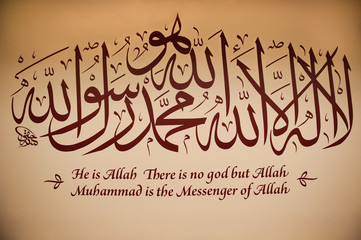
Islam, one of the world’s major religions with over 1.8 billion followers, is built upon five fundamental acts of worship that shape a Muslim’s life. These Five Pillars of Islam represent the core beliefs and practices that unite Muslims worldwide, regardless of cultural or ethnic differences. In this comprehensive guide, we’ll explore each pillar in detail, examining its significance, historical context, and practical application in modern Muslim life.
Table of Contents
Shahada: The Declaration of Faith
The Shahada (الشهادة) is the Islamic creed and the first of the Five Pillars. This simple yet profound declaration states:
“There is no god but Allah, and Muhammad is the messenger of Allah.”
This testimony of faith is the foundation of Islam and distinguishes Muslims from followers of other religions. The Shahada represents:
- Tawhid – The absolute oneness of God
- Risalah – Acceptance of Muhammad’s prophethood
- Akhirah – Belief in the Day of Judgment
When someone converts to Islam, reciting the Shahada with sincere belief before witnesses marks their formal entry into the Muslim community. This declaration is also whispered into the ears of newborns and is ideally the last words a Muslim utters before death.

Beautiful calligraphy of the Shahada in Arabic script
Historical Context
The concept of Shahada originates from the Quran and the teachings of Prophet Muhammad (PBUH). The first part affirms monotheism, continuing the tradition of earlier prophets like Abraham, Moses, and Jesus. The second part acknowledges Muhammad’s role as the final messenger in this chain of prophethood.
Salah: The Ritual Prayer
Salah, the second pillar of Islam, refers to the five daily prayers that Muslims perform at prescribed times throughout the day. These prayers serve as a direct link between the worshipper and Allah, fostering spiritual discipline and mindfulness.
Fajr
Dawn prayer
Dhuhr
Noon prayer
Asr
Afternoon prayer
Maghrib
Sunset prayer
Isha
Night prayer
Each prayer consists of a specific number of units called rak’ahs, combining recitations from the Quran, physical movements (standing, bowing, prostrating), and supplications. Before prayer, Muslims perform wudu (ablution) to ensure physical and spiritual purity.
Benefits of Salah
Spiritual
Maintains constant connection with Allah
Psychological
Reduces stress and increases mindfulness
Physical
Gentle exercise through prayer movements
Social
Strengthens community bonds in congregation
Friday noon prayer (Jumu’ah) holds special significance as a weekly congregational prayer where Muslims gather at mosques to listen to a sermon (khutbah) before performing the prayer together.
Zakat: Almsgiving
Zakat, often translated as “alms-giving” or “charity,” is the third pillar of Islam. It’s a mandatory charitable contribution that financially capable Muslims must pay annually to support those in need and maintain social welfare.
Key Aspects of Zakat
- Nisab: Minimum wealth threshold (equivalent to 85g of gold)
- Rate: Typically 2.5% of savings and investments
- Recipients: Poor, needy, debtors, travelers, and others specified in Quran 9:60
- Timing: Paid annually after one lunar year of ownership
Philosophy Behind Zakat
Zakat serves multiple purposes in Islamic society:
- Purifies wealth and soul from greed
- Reduces economic inequality
- Fosters social solidarity
- Circulates wealth in society
Modern Applications
Today, many Muslim communities have established Zakat funds and committees to systematically collect and distribute Zakat. Some contemporary scholars have expanded the interpretation of Zakat to include modern financial assets like stocks, retirement accounts, and business inventory. Many Muslims now use online Zakat calculators to determine their exact obligation.
Sawm: Fasting in Ramadan
The fourth pillar of Islam is Sawm, or fasting during the holy month of Ramadan. From dawn until sunset each day, adult Muslims abstain from:
Food
Drink
Smoking
Sexual relations
Negative behavior
Fasting during Ramadan is obligatory for all adult Muslims, with exceptions for those who are ill, traveling, pregnant, breastfeeding, menstruating, or experiencing other valid reasons. The fast is broken each evening with a meal called Iftar, often beginning with dates and water following the Sunnah of Prophet Muhammad (PBUH).
Spiritual Benefits
- Develops self-discipline and self-restraint
- Increases gratitude and empathy for the less fortunate
- Strengthens willpower against temptations
- Enhances spiritual awareness and connection with Allah
Health Benefits
- Promotes detoxification and weight management
- May improve metabolic health and insulin sensitivity
- Encourages mindful eating habits
- Provides digestive system rest
Laylat al-Qadr
The “Night of Power” during the last ten days of Ramadan commemorates when the Quran was first revealed to Prophet Muhammad (PBUH). Muslims believe worship on this night is better than a thousand months of worship. Many spend these nights in prayer, Quran recitation, and supplication.
Hajj: The Pilgrimage to Mecca
Hajj, the fifth pillar of Islam, is the annual pilgrimage to Mecca that every physically and financially capable Muslim must perform at least once in their lifetime. This profound spiritual journey occurs during the Islamic month of Dhu al-Hijjah and retraces the footsteps of Prophet Muhammad (PBUH) and Prophet Abraham before him.
Key Rituals of Hajj
- Ihram: Entering sacred state with special garments
- Tawaf: Circling the Kaaba seven times
- Sa’i: Walking between Safa and Marwah hills
- Wuquf: Standing at Mount Arafat
- Ramy al-Jamarat: Stoning the devil pillars
- Qurbani: Animal sacrifice (Eid al-Adha)
Symbolism of Hajj
Each aspect of Hajj carries deep spiritual meaning:
- Ihram: Equality before Allah regardless of worldly status
- Tawaf: Cosmic orbit around divine center
- Arafat: Standing before Allah in judgment
- Sacrifice: Willingness to give up for Allah
After successfully completing Hajj, pilgrims earn the title “Hajji” (for men) or “Hajjah” (for women). The experience often brings profound personal transformation, with many reporting increased patience, gratitude, and spiritual awareness.
Unity Through Practice
The Five Pillars of Islam serve as the unifying framework for Muslim life worldwide. From Indonesia to Nigeria, from Morocco to the United States, these practices create a shared rhythm of devotion that transcends cultural and geographical boundaries. While interpretations and emphases may vary among different Muslim communities, the Five Pillars remain the constant foundation that defines Islamic worship and shapes Muslim identity.
Through Shahada, Salah, Zakat, Sawm, and Hajj, Muslims express their submission to Allah, maintain spiritual discipline, fulfill social responsibilities, and strengthen community bonds. These pillars are not merely rituals but a comprehensive system for holistic living that balances individual spirituality with social welfare, personal discipline with communal solidarity.
Frequently Asked Questions
Q: Can someone be Muslim without practicing all Five Pillars?
A: While Muslims may struggle with consistent practice, the Five Pillars are considered obligatory for all capable adults. Intentionally rejecting any pillar would contradict Islamic teachings, though temporary inability (due to health, finances, etc.) is accommodated with alternative practices when possible.
Q: How do the Five Pillars relate to the Six Articles of Faith?
A: The Six Articles of Faith represent core Islamic beliefs (in Allah, angels, scriptures, prophets, Day of Judgment, and divine decree), while the Five Pillars are the primary acts of worship that put those beliefs into practice. Together they form the complete framework of Islamic faith and practice.
Q: Are there differences in how various Islamic schools interpret the Pillars?
A: While all major Islamic schools agree on the fundamental obligation of the Five Pillars, there are minor differences in details like prayer positions, Zakat calculations, or Hajj procedures. These variations reflect the diversity within Islamic scholarship while maintaining unity on essentials.